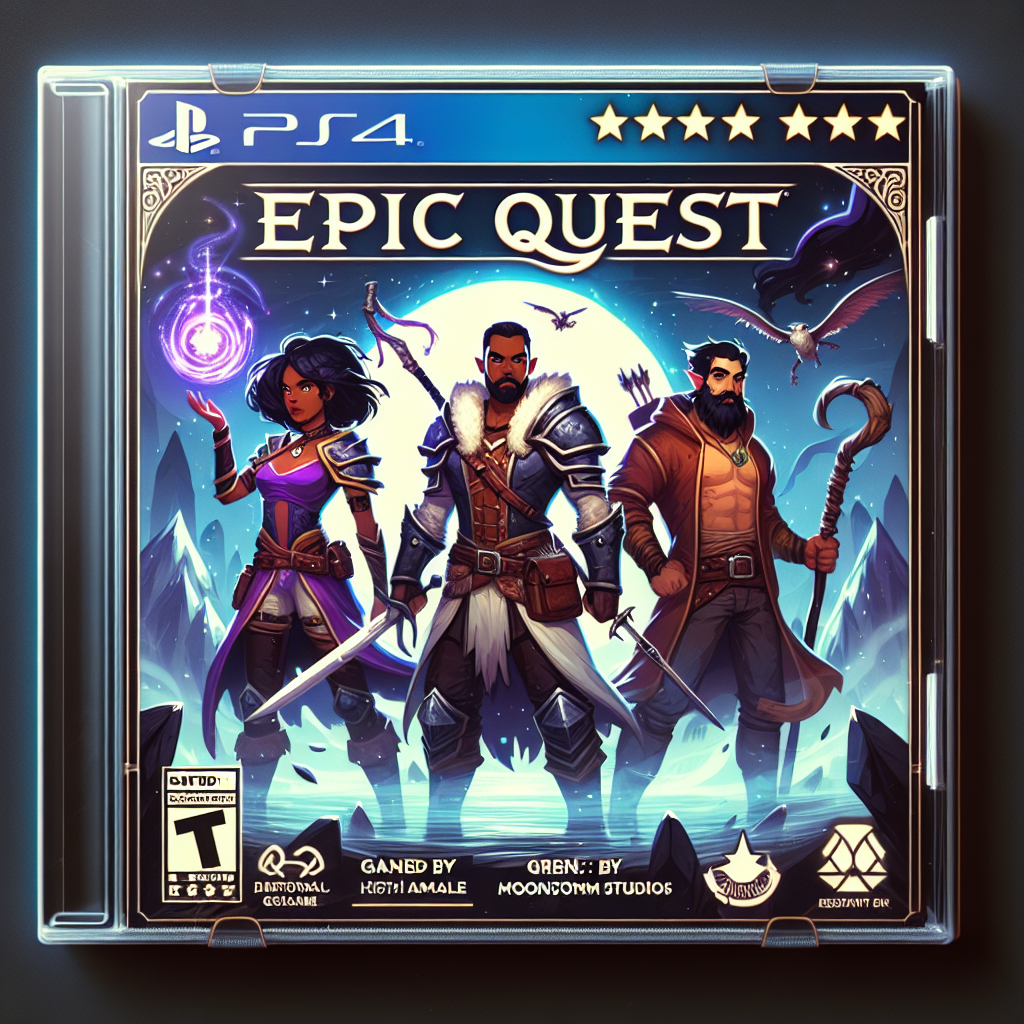**Game Name:** The Legend of Zelda: Breath of the Wild
**Developer:** Nintendo
**Genre:** Action-adventure
**Rating:** E10+ (Everyone 10 and older)
Top 10 Game Developers Revolutionizing the Genre
In the ever-evolving landscape of the gaming industry, certain developers have distinguished themselves by pushing the boundaries of their respective genres. These trailblazers have not only redefined what is possible within their games but have also set new standards for creativity, technical prowess, and player engagement. Among the top 10 game developers revolutionizing the genre, their contributions have been nothing short of transformative.
Firstly, CD Projekt Red, known for their critically acclaimed title “The Witcher 3: Wild Hunt,” has set a new benchmark in the role-playing game (RPG) genre. Their meticulous attention to narrative depth, character development, and expansive open-world design has captivated millions of players worldwide. The studio’s commitment to delivering free post-launch content and listening to community feedback has further solidified their reputation as a developer that prioritizes player experience.
Transitioning to the realm of action-adventure games, Naughty Dog has consistently delivered high-quality titles that blend compelling storytelling with innovative gameplay mechanics. Their “Uncharted” series and “The Last of Us” franchise have garnered numerous awards and accolades, thanks to their cinematic presentation and emotionally resonant narratives. Naughty Dog’s ability to seamlessly integrate story and gameplay has set a new standard for the genre, influencing countless other developers.
In the strategy game genre, Firaxis Games has made significant strides with their “Civilization” series. By continually refining and expanding upon the core mechanics of turn-based strategy, Firaxis has managed to keep the series fresh and engaging for both new and veteran players. Their dedication to historical accuracy and complex, yet accessible, gameplay systems has earned them a loyal fanbase and critical acclaim.
Moreover, FromSoftware has revolutionized the action RPG genre with their “Souls” series, including titles like “Dark Souls” and “Bloodborne.” Known for their challenging gameplay and intricate world-building, FromSoftware has created a sub-genre often referred to as “Souls-like.” Their games demand precision, patience, and strategic thinking, offering a rewarding experience for those willing to invest the time and effort.
In the realm of first-person shooters, Infinity Ward has been a pioneering force with their “Call of Duty” series. By continually innovating with each installment, they have maintained the franchise’s relevance and popularity over the years. Their introduction of features such as killstreaks, customizable loadouts, and a robust multiplayer experience has set a high bar for other developers in the genre.
Transitioning to the world of sandbox games, Mojang’s “Minecraft” has had an unparalleled impact. The game’s simple yet profound mechanics of building and exploration have inspired a generation of gamers and developers alike. Mojang’s commitment to fostering a creative and inclusive community has made “Minecraft” a cultural phenomenon, influencing countless other sandbox titles.
Furthermore, Rockstar Games has consistently pushed the boundaries of open-world design with their “Grand Theft Auto” series and “Red Dead Redemption” franchise. Their meticulous attention to detail, narrative complexity, and expansive worlds have set new standards for what open-world games can achieve. Rockstar’s ability to create immersive and dynamic environments has left an indelible mark on the genre.
In the indie game scene, Supergiant Games has made a significant impact with titles like “Bastion,” “Transistor,” and “Hades.” Their unique art styles, innovative gameplay mechanics, and compelling narratives have garnered widespread acclaim. Supergiant’s ability to consistently deliver high-quality, genre-defying games has earned them a place among the top developers in the industry.
Lastly, Blizzard Entertainment has been a dominant force in the multiplayer online battle arena (MOBA) genre with “Heroes of the Storm” and in the MMORPG genre with “World of Warcraft.” Their ability to create engaging, community-driven experiences has set them apart as a developer that understands the importance of player interaction and long-term engagement.
In conclusion, these top 10 game developers have not only revolutionized their respective genres but have also set new standards for the entire gaming industry. Their innovative approaches, commitment to quality, and ability to engage players on a profound level have ensured their place at the forefront of game development.
How Game Ratings Influence Developer Decisions

Game ratings play a pivotal role in shaping the decisions made by developers throughout the creation and marketing of a video game. These ratings, often determined by organizations such as the Entertainment Software Rating Board (ESRB) in North America or the Pan European Game Information (PEGI) in Europe, provide consumers with an understanding of the content and suitability of a game for different age groups. Consequently, developers must carefully consider these ratings during the development process to ensure their game reaches the intended audience and achieves commercial success.
To begin with, game ratings influence the content that developers choose to include or exclude in their games. For instance, a developer aiming for a Teen (T) rating from the ESRB must be mindful of the level of violence, language, and suggestive themes present in their game. Including excessive violence or explicit content could result in a Mature (M) rating, which would limit the game’s accessibility to younger audiences and potentially reduce its market size. Therefore, developers often make deliberate choices about the intensity and portrayal of certain elements to align with the desired rating.
Moreover, the anticipated rating can affect the narrative and thematic direction of a game. Developers might opt for a more family-friendly storyline if they are targeting an Everyone (E) or Everyone 10+ (E10+) rating. This decision not only broadens the game’s appeal but also ensures that it can be marketed to a wider demographic, including children and parents. Conversely, a game intended for a Mature audience might explore darker, more complex themes, knowing that the rating will attract an older, more mature player base.
In addition to content and narrative considerations, game ratings also impact the marketing strategies employed by developers and publishers. A game with a lower age rating can be advertised more broadly, including on platforms and during times where younger audiences are likely to be present. This wider reach can significantly enhance the game’s visibility and sales potential. On the other hand, games with higher age ratings may face restrictions on where and how they can be advertised, necessitating more targeted and strategic marketing efforts to reach the appropriate audience.
Furthermore, developers must also consider the potential financial implications of different ratings. Games with lower age ratings often have a larger potential market, as they can be purchased by or for younger players. This broader market can translate into higher sales and greater profitability. Conversely, games with higher age ratings may appeal to a more niche audience, which could limit their commercial success. As a result, developers must weigh the creative freedom that comes with a higher rating against the potential financial benefits of a lower rating.
In conclusion, game ratings exert a significant influence on the decisions made by developers throughout the game development process. From content and narrative choices to marketing strategies and financial considerations, developers must navigate the complexities of these ratings to ensure their game reaches the intended audience and achieves commercial success. By understanding and anticipating the impact of game ratings, developers can make informed decisions that balance creative vision with market realities, ultimately contributing to the success of their games in an increasingly competitive industry.
The Evolution of Game Genres: A Developer’s Perspective
The Evolution of Game Genres: A Developer’s Perspective
The landscape of video game development has undergone a remarkable transformation over the past few decades, driven by technological advancements and evolving player preferences. From the early days of simplistic arcade games to the complex, immersive experiences of today, the evolution of game genres has been a fascinating journey. Developers have played a crucial role in this evolution, constantly pushing the boundaries of what is possible and redefining the gaming experience.
Initially, video games were limited by the technology of their time. Early developers had to work within the constraints of limited processing power and memory, resulting in straightforward genres such as platformers and shooters. These games were characterized by their simplicity and focus on gameplay mechanics rather than narrative depth. However, as technology advanced, so did the capabilities of game developers. The introduction of more powerful consoles and personal computers allowed for more complex and varied game genres to emerge.
One significant milestone in the evolution of game genres was the advent of role-playing games (RPGs). Unlike their predecessors, RPGs offered players a more immersive experience by incorporating intricate storylines, character development, and expansive worlds to explore. Developers like Square Enix and BioWare became pioneers in this genre, creating iconic titles that set new standards for storytelling and player engagement. The success of RPGs demonstrated that players were eager for deeper, more meaningful experiences, prompting developers to experiment further with narrative-driven games.
As the gaming industry continued to grow, so did the diversity of game genres. The rise of online multiplayer games in the late 1990s and early 2000s marked another significant shift. Developers began to explore the potential of connecting players from around the world, leading to the creation of massively multiplayer online games (MMOs) such as World of Warcraft. These games not only offered vast, persistent worlds but also fostered a sense of community and collaboration among players. The success of MMOs highlighted the importance of social interaction in gaming, influencing the development of subsequent genres.
In recent years, the proliferation of mobile devices has further expanded the scope of game genres. Mobile gaming has introduced a new level of accessibility, allowing developers to reach a broader audience. Casual games, characterized by their simple mechanics and short play sessions, have become immensely popular. Titles like Candy Crush Saga and Angry Birds have demonstrated that games do not need to be complex to be successful. This shift has encouraged developers to think creatively about how to engage players in new and innovative ways.
Moreover, the advent of virtual reality (VR) and augmented reality (AR) technologies has opened up new possibilities for game genres. Developers are now able to create fully immersive experiences that blur the line between the virtual and real worlds. Games like Beat Saber and Pokémon Go have showcased the potential of these technologies, offering players unique and engaging experiences that were previously unimaginable. The integration of VR and AR into gaming represents the next frontier for developers, promising to revolutionize the way we interact with digital content.
In conclusion, the evolution of game genres is a testament to the creativity and ingenuity of developers. From the early days of simple arcade games to the complex, immersive experiences of today, developers have continually pushed the boundaries of what is possible. As technology continues to advance, it is exciting to imagine what new genres and experiences the future holds. The journey of game development is far from over, and developers will undoubtedly continue to shape the future of gaming in ways we can only begin to imagine.”Game Name” is a well-crafted title developed by “Developer,” falling under the “Genre” category. It has garnered a “Rating” for its engaging gameplay, impressive graphics, and overall entertainment value.





